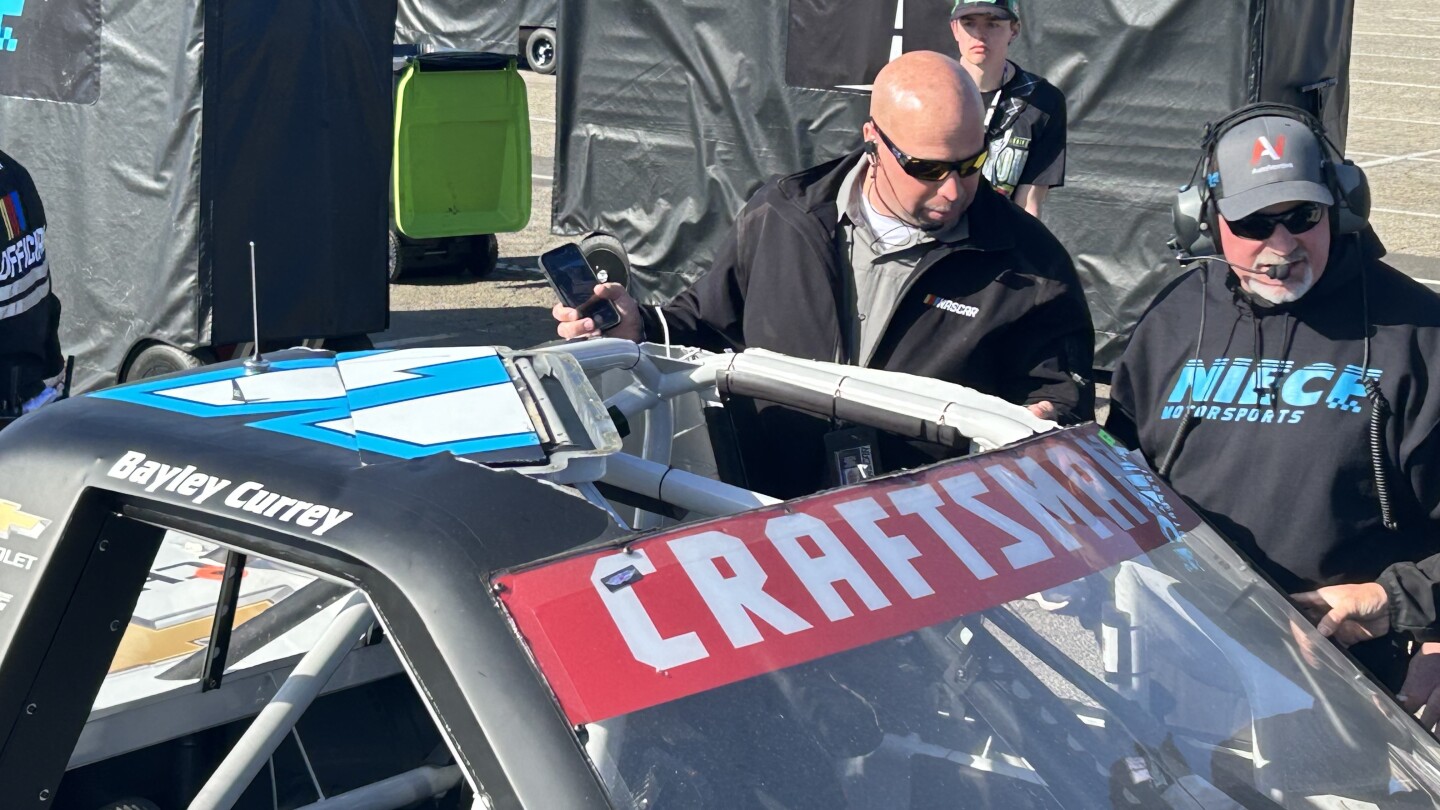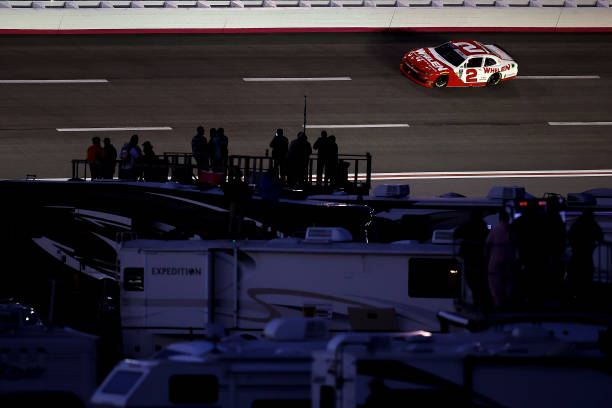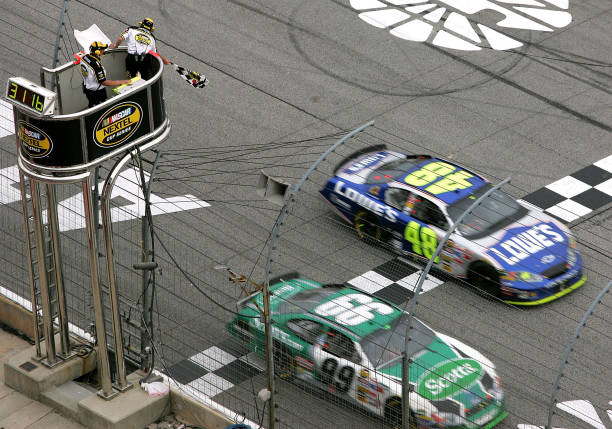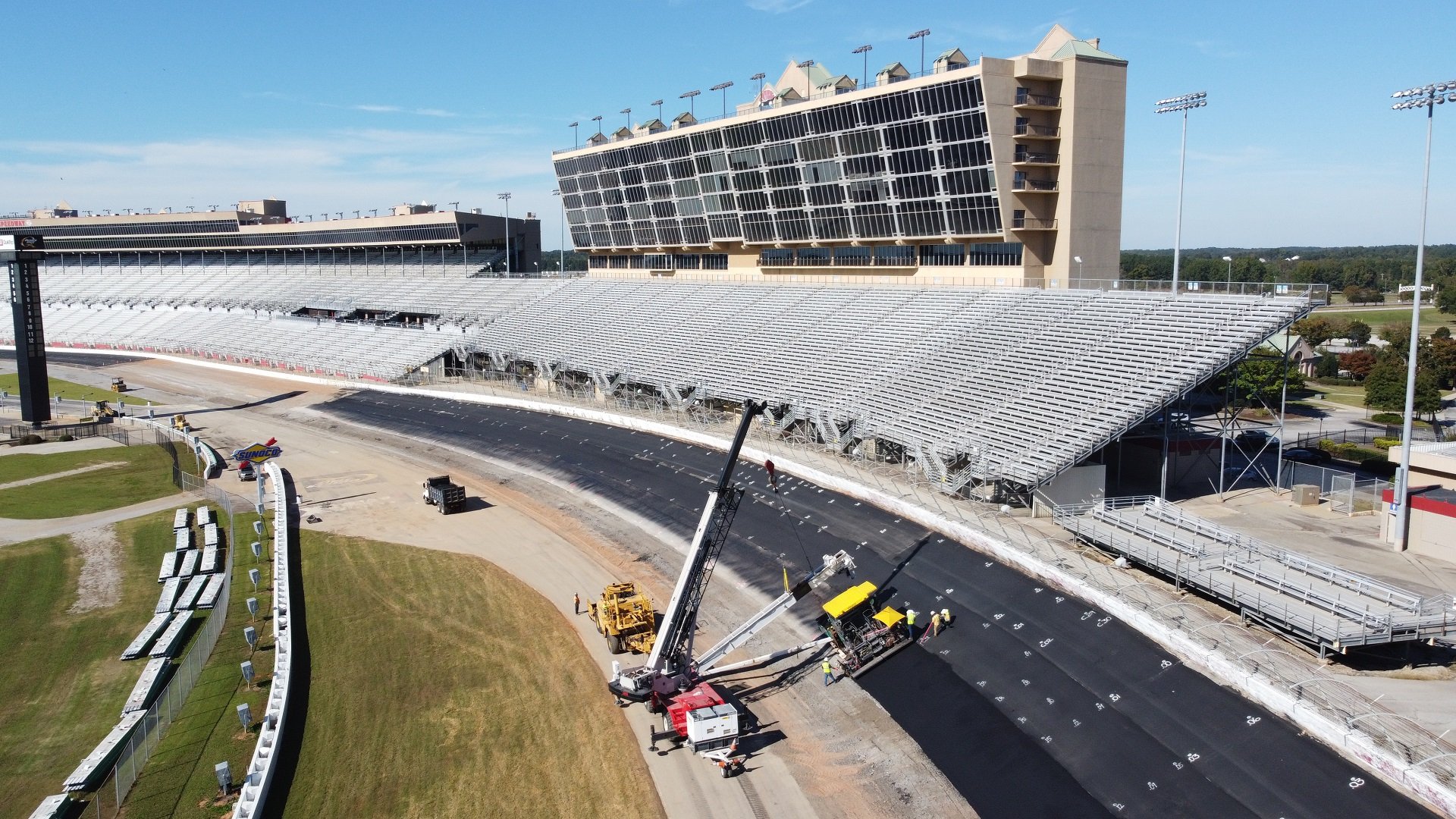The answer to the article’s title might seem to be obvious after last night’s race. How often do NASCAR fans (or racing fans in general) get to see a 3-wide, photo finish to end a race? Daniel Suarez emerged victorious by the third slimmest margin in NASCAR Cup Series history. On top of the finish, the Ambetter Health 400 was a great race from beginning to end. While some may roll their eyes at that notion since it is a superspeedway, it is difficult to argue that the on-track action was not thoroughly entertaining. When Marcus Smith decided to reconfigure Atlanta, this is the racing he was hoping to host. However, the former Atlanta is still beloved by drivers and fans alike. Does this past Sunday move the needle? Is new Atlanta better than traditional Atlanta?
While Sunday’s race was excellent, more than a single race can be factored into this discussion. On Saturday, the Xfinity and Craftsman Truck Series both provided dullards of on-track action. Sure, the wind was a major factor (especially for the Truck Series), but the two lower series have consistently underwhelmed at the new Atlanta Motor Speedway. While the Cup Series have put on good showings the past 3 races, the first two new Atlanta races were a bit of a dud. New Atlanta is certainly unique compared to Daytona and Talladega. Questions about how long this style of racing will remain at Atlanta persist. However, Atlanta seems to be an important track for NASCAR, especially this season. An exciting race following from the Daytona 500 is great for NASCAR, but does this mean sustained success with this track?
New Atlanta Thrills… On Sunday
Once again, it would be real stretch to call Sunday’s race anything other than entertaining racing. Even those who despise this type of racing have admit Sunday was fun. Fun became a common word from the drivers as well. Either over their radios or in interviews, the word “fun” was being thrown around by the drivers for the first time about this track since the reconfiguration. Every driver has different feelings to the superspeedway style, but it was surprising to hear that many declare they were having a good time. Probably the best quote came from Todd Gilliland, who compared the racing to a haunted house.

Whacky Trucks & Boring Xfinity
However, the action was only compelling when the NextGen cars took to the track. Saturday’s doubleheader was the type of slog that NASCAR fans suffer through to support their driver. Starting off with the Fr8 208, the race was only entertaining for the myriad of issues plaguing the teams. Christian Eckes lost his brakes after winning Stage 1, but that did not stop him from running laps in Stage 2 with a wonder on how he was going to stop. Meanwhile, Bayley Currey introduced the first convertible NASCAR truck. The flying debris from Currey struck Ty Dillon’s truck, causing severe damage. Yet, Layne Riggs was the one who got disqualified for an issue with his windshield. NASCAR officiating and not making any sense, a tale as old as time.
For the night cap, the insanity was toned down but replaced with paint-drying boredom. One of the few perks of superspeedway racing should be the constant battles for the lead. However, Jesse Love managed to lead 157 of 169 laps. The only reason he lost the race was due to a caution for the Fords running out of fuel. An “exciting” finish played out only because cars were dropping like flies as they ran out of fuel. Also, if a car is stalled on the race track, should that not be a caution? Once again, NASCAR officiating taking center stage.

Memorable Traditional Atlanta Finishes
While the exciting finish of Sunday’s race will help bolster the case for new Atlanta, do not forget that Atlanta Motor Speedway has a history of fantastic finishes. Three immediately come to mind: Carl Edwards and Jimmie Johnson from 2005, Kevin Harvick and Jeff Gordon from 2001, and Dale Earnhardt and Bobby Labonte from 2000. All three of these finishes were under .030 seconds margin of victory. However, they were not setup by race-long drafting that keeps the cars close throughout the race. Instead, there was tension in the final moments as one driver attempted to catch the other.
For those who view superspeedway racing with ire, these finishes automatically rank higher due to the lack of pack drafting. There is beauty in the tension of wondering if a driver will catch the leader in time to make the pass. Meanwhile, the ending of the Ambetter Health 400 felt a bit forgone in its conclusion. Sure, no one could have thought a 3-wide finish like that was likely to occur. However, everyone watching was waiting for Kyle Busch or Daniel Suarez to attempt their move on the last lap. There is something a bit formulaic to the process. Meanwhile, these traditional Atlanta finishes were never a foregone conclusion. The excitement first came from the chase, then followed by the pass (or attempted pass) for the win.

Now, excitement is purely subjective. While one fan can find Sunday’s finish formulaic and tiresome, another can think its the greatest finish since the Dinoco 400 in Cars. At the same time, a fan can find the chase during the closing laps of a race boring and uneventful while the other fan is having heart palpitations. Either way, Atlanta has not continued its tradition of photo finishes at the line. While it was a fantastic finish, Sunday’s race was not unique to new Atlanta.
Before the Ambetter Health 400
Arguably, only the past three Cup Series races at Atlanta Motor Speedway have been compelling enough to justify the switch. After 2022, everyone hated the reconfiguration. While the track was in need of a repave, the decision to switch the classic intermediate into a Frankenstein’s monster of a superspeedway was ill-received. Outside of the spring Cup finish and the chaotic nature of the summer Cup race, little in 2023 helped to improve the track’s standing. Evident by the anonymous responses in Jordan Bianchi’s poll prior the Daytona 500, the new Atlanta Motor Speedway was still hated by drivers and teams. Fans were also pretty vocal about their disdain as well.
However, there were defenders of Marcus Smith’s vision. Most notably from the media personalities. Dale Earnhardt Jr came out before Sunday’s race to state that Atlanta had hosted the “best race [he] saw in person” last year. NASCAR journalists were on record saying the move was smart to help bolster Atlanta. From a purely entertainment format, the argument for new Atlanta makes sense. Keeping the cars close together adds to the drama since one wrong move can be disaster for numerous drivers. The leader cannot drive away from the pack, which should equal more lead changes and an exciting finish. For a casual viewer, this is the NASCAR racing that is more marketable. Not only is it “exciting”, but it is completely unique to NASCAR.
Prior to Sunday, there was an easy fluidity between the two view points. Saturday definitely did not help the supporters. However, those people were claiming to wait until the Cup Series had their time. Sunday bolstered their case for the supporting the switch. Even the most die-hard traditionalist would struggle to negate the positives in Sunday’s racing. If new Atlanta can keep this racing up, then the reconfiguration is a slam dunk win. Marcus Smith is a genius and all NASCAR fans benefit from his existence. Right?
The Future of New Atlanta
A lot of focus (deservingly so) will be placed on Sunday’s race. However, what about the future of the track? Before determining whether the switch was right or wrong, how the track will age has a major factor in determining the success of the reconfiguration. Heading into the weekend, there was talk that the new Atlanta would not always be a superspeedway-type race. As the track ages, the grip will leave and drivers will be unable to run wide open for an entire race. This will result in more spacing between the cars, turning it closer into the traditional Atlanta rather than what fans are seeing now.
After Sunday, those comments might not be viewed as positively as prior to the Cup race. Even before Sunday, the thought of this newly reconfigured track warping back into the traditional style of Atlanta racing was met with derision. From the traditionalist fans, the question became why did Smith and SMI reconfigure the track if it was going to return to standard form anyway. Now that Sunday has come and gone, the supporters of the new Atlanta will wonder why Smith and SMI would want this type of racing to disappear. A bit of a nightmare for Marcus Smith, SMI, and NASCAR.
Repaving to Keep the Draft

Based on Sunday’s race, fans can see how the racing could end up shifting back to a traditional intermediate style. Drivers struggled to stay wide open throughout the race. Cars were slipping around the track more than they did previously at Atlanta. Especially in the heat of the afternoon, the pack racing was definitely unique. It is not difficult to imagine in 3-5 years where pack racing fades away from the bulk of an Atlanta race. For the lower series, the teams are already split between running superspeedway and intermediate chassis.
Prior to Sunday’s race, that would not be too much of a concern. While fans would be skeptical if new Atlanta would ever run similar to old Atlanta, surely they would be hoping it would happen. After that Cup race though, would SMI allow this style of racing to leave this surface? It would seem unlikely at this point, which would mean a repave occurring sooner than expected. Depending on how long new Atlanta provides Sunday’s style of racing, is it worth repaving every 6-8 years for a handful of Sunday-style races? Remember, it took five race weekends (12 races) to get to Sunday. Is that worthwhile?
Is New Atlanta Better?
The most accurate answer here would be to say “too early to tell.” Five race weekends is tough to compare to the rest of Atlanta Motor Speedway’s history. However, an indecisive answer would not be worthwhile or honest. Despite what occurred on Sunday, new Atlanta Motor Speedway is not better than the pre-2022 track. Now, if the next 4-5 years of Cup races are like Sunday, then that answer changes. However, there is little faith that new Atlanta will remain this weird superspeedway. The track surface is already showing signs of weathering. Once drivers are unable to stay in the pack, the fear is that the reconfiguration will lend the racing more so to the Texas Motor Speedway style rather than traditional Atlanta.
With that said, it is difficult to argue against the reconfiguration being a short term success. Atlanta looked packed for Sunday’s race. It will be interesting to see how the ratings were for this race, as it was on FOX and followed up a good rating for the Daytona 500 (on a Monday). Surely, the ratings will prove NASCAR was correct in their schedule switch-up. Short term success is great for NASCAR. Despite the skepticism, the hope is that new Atlanta thrives.
However, the long term success is where the newly configured Atlanta will likely fall short. This track is not going to remain how it currently is. Once that aura leaves, the fan hype and support will also fade. SMI cannot continuously chase Sunday’s race with repave after repave. Even with how great Sunday was, the financial cost alone would be crippling. If they let the track age, what will the racing look like? Will it be what the traditional Atlanta was? While that was great for hardcore fans, there is a chance the casual fan will not remain. Worse would be if the racing resemble Texas rather than traditional Atlanta, which is unnerving to consider.
New Atlanta had its first memorable moment, but it does feel manufactured compared to the other great finishes at the track. This is coming from a writer who adores superspeedway racing. However, new Atlanta is still a Frankenstein’s monster of a track that replaced a beloved track. It should have been Texas. Hopefully, this article ages poorly and new Atlanta continues to produce successful race weekends.


